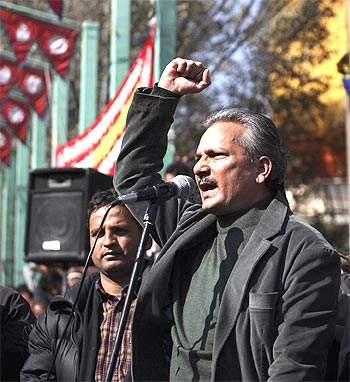 | « Back to article | Print this article |
Nepal Maoists continue to parlayse normal life
 As the Maoists paralysed normal life in Nepal for the second day in running, the government beefed up security on Monday amid warning by a top former rebel leader that they may declare a new constitution from the streets.
As the Maoists paralysed normal life in Nepal for the second day in running, the government beefed up security on Monday amid warning by a top former rebel leader that they may declare a new constitution from the streets.
Fresh scuffles broke out between police and agitating Maoists cadres as the ultras enforced shutdown in Kathmandu and other major towns as part of their three-day anti-government protests to step up pressure on the government to rectify the 'unconstitutional' decision of the President Ram Baran Yadav linked to the former army chief.
Clashes were reported as the Maoists torched some vehicles with the government responding by ordering larger police force onto the streets and a top United Nations body calling for restraint.
'The government will take appropriate steps' to deal with the situation, Deputy Prime Minister Vijaya Gachhcadar warned.
He said acts of violence and the shutdown called by the Maoists were in breach of the Comprehensive Peace Agreement. However, Deputy Maoists' leader Baburam Bhattarai threatened to declare a constitution from the streets.
Bhattarai, who is the coordinator of the party's anti-government agitation, said the United Communist Party of Nepal-Maoists will declare a constitution through a people's revolt from the streets if the 601-member Constituent Assembly failed to frame a new constitution by May 28, 2010, the Republica newspaper reported.
Nepal deputy prime minister's tough talk came as vehicles remained off the roads, main shopping complexes and market areas had shutters down and schools and colleges were closed in the capital.
Agitating Maoist workers marched in various parts of the capital shouting anti-government slogans. Gachhcadar said the government will take action against those using force to enforce the strike.
Nepali Congress, one of the main constituents of the ruling multi-party alliance has strongly assailed the Maoists violence and not heeding to calls to desist from street protests.
The political parties are deadlocked over the Maoists' demand to rectify the decision of the president, who reinstated General Rukmangad Katawal, the then Army Chief dismissed by Maoists Prime Minister Prachanda in May.
Political tensions have been high in Nepal since a government led by the Communist Party of Nepal-Maoist resigned earlier this year amid the dispute with the president over the army chief's refusal to incorporate former Maoist rebels fighters into the military.
The Maoists, who have around 40 percent of the seats in parliament, argue that the president's move was unconstitutional and has compromised 'civilian supremacy' over the military.
The office of the High Commissioner for Human Rights Nepal has expressed serious concern over Sunday's violence in which stone pelting Maoists mob tried to obstruct a cavalcade of the Prime Minister Madhav Kumar Nepal, who was returning from Copenhagen.
Two dozen people including a senior police officer and a Maoist Lawmaker, were injured in the scuffles.
Nepal Home Minister Bhim Rawal, who met other cabinet ministers and top security officials said that the violence that occurred during the first day of the Maoist general strike jeopardise the peace process.
Appealing to the Maoists to withdraw their nationwide strike, Rawalsaid the security forces exercised maximum restraint during the bandh. A total of 10 people have so far been arrested, including six from Kathmandu, for forcefully enforcing the strike.
The Maoists vandalised a truck in Jhapa district, damaged a vehicle in Chitawan, burnt a vehicle in Kohalpur and set on blaze four motorcycles in Morang for defying their shut down.
In Surkhet Municipality, the Maoists vandalised the Women's Development Office and the United States Assistance for International Development office.
They also vandalised District Education Office and Department for Land Measurement in Panchthar district, officials said. The deepening political crisis after the Maoists stepped up its anti-government protests has put new stresses on Nepal's reconciliation efforts amid fears that the stalled peace process may be derailed if the agitation by the former rebels is not ended soon.
Image: Maoist vice chairman Baburam Bhattarai addresses the crowd in a protest during the second day of their three-day nationwide general strike in Kathmandu on Monday
Photograph: Shruti Shrestha / Reuters
Text: Shirish B Pradhan in Kathmandu for PTI